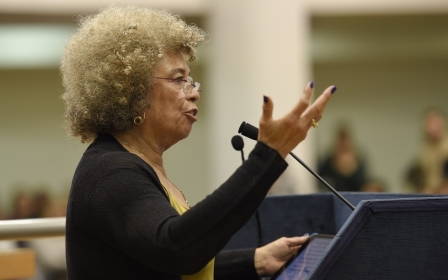Former legislator in Maryland sues state over anti-BDS law
A software engineer and former state legislator is suing the US state of Maryland over its anti-boycott law.
Saqib Ali, who became the first Muslim member of the Maryland House of Delegates in 2006, said he refused to sign a "loyalty oath" pledging that he does not boycott Israel, in order to win a contract to build a computer programme for the state.
"I do boycott Israel and the illegally occupied territories because Palestinians are not free; they live under a brutal military occupation," Ali said at a news conference announcing the lawsuit on Wednesday.
"And until that occupation is ended, I decided I will boycott Israel. It is my First Amendment right. It is guaranteed by the US Constitution."
Maryland is one of the dozens of states that have passed measures banning government entities from hiring companies that boycott Israel.
The push is part of a nationwide effort to counter the Boycott, Divestment and Sanctions (BDS) movement, which seeks to pressure Israel economically and politically to end its abuses against Palestinians.
Critics of such measures say they restrict freedom of speech, protect a foreign nation from criticism and censor meaningful debate about the Israeli-Palestinian conflict.
Last year, US courts in Kansas and Arizona ruled that it is unconstitutional to force government contractors to refrain from boycotting Israel, blocking the anti-BDS laws in both states.
In the case of Maryland, the anti-boycott measure was enacted through an executive order by Republican Governor Larry Hogan in 2017, after it failed to pass through the legislature.
Hogan has defended the executive order, saying that it aims to protect Israel from BDS.
"They’re asking people to discriminate against Israel," he said of the movement after signing the order in 2017, as reported by the Baltimore Sun at the time. "There’s no argument to the contrary that makes any sense."
'I will not have that'
On Wednesday, Ali stressed that he regularly engages in political boycotts that are not limited to Israel.
He said he has previously boycotted North Carolina because it passed a law that would harm transgender people, and currently he does not deal with any businesses owned by President Donald Trump's family.
"All these boycotts are protected by the First Amendment of the US Constitution," Ali said. "So when the governor of Maryland, Larry Hogan, demands that I give up my First Amendment rights to apply for a contract, he's violating my right to free speech, and I will not have that."
Gadeir Abbas, a lawyer for the Council of American Islamic Relations (CAIR), which is assisting Ali with the lawsuit, called the Maryland governor's executive order "clearly illegal".
"Americans, since the founding of this country - even before the founding of this country - have engaged and expressed themselves via boycotts," Abbas said at the news conference, citing boycotts of British tea in the early 1770s prior to the US Revolutionary War and the solidarity campaign against the apartheid regime in South Africa throughout the 1970s and 80s.
"Saqib's case is no different. He should not have to abandon his constitutional rights to compete and apply for state contracts."
Ali's lawsuit is at least the third pending legal challenge to anti-BDS measures. An educator in Texas and a newspaper publisher in Arkansas have sued their respective states over such laws.
Free speech advocates have opposed anti-BDS laws, saying that they violate the US Constitution. The American Civil Liberties Union (ACLU) has said such measures threaten "fundamental First Amendment values".
Still, some members of the US Congress are pushing to legitimise anti-BDS laws at the federal level.
Republican Senator Marco Rubio introduced a bill last week encouraging states to "divest" from companies that boycott Israel.
Democrats, who had vowed not to take up any legislation that does not address the ongoing partial government shutdown, blocked debate over Rubio's bill on Tuesday evening.
The proposal, which also includes provisions relating to aid to Jordan and US policy in Syria, is not defeated, however. On Wednesday morning, it resurfaced and debate on the bills was ongoing as of publication.
New MEE newsletter: Jerusalem Dispatch
Sign up to get the latest insights and analysis on Israel-Palestine, alongside Turkey Unpacked and other MEE newsletters
Middle East Eye delivers independent and unrivalled coverage and analysis of the Middle East, North Africa and beyond. To learn more about republishing this content and the associated fees, please fill out this form. More about MEE can be found here.




